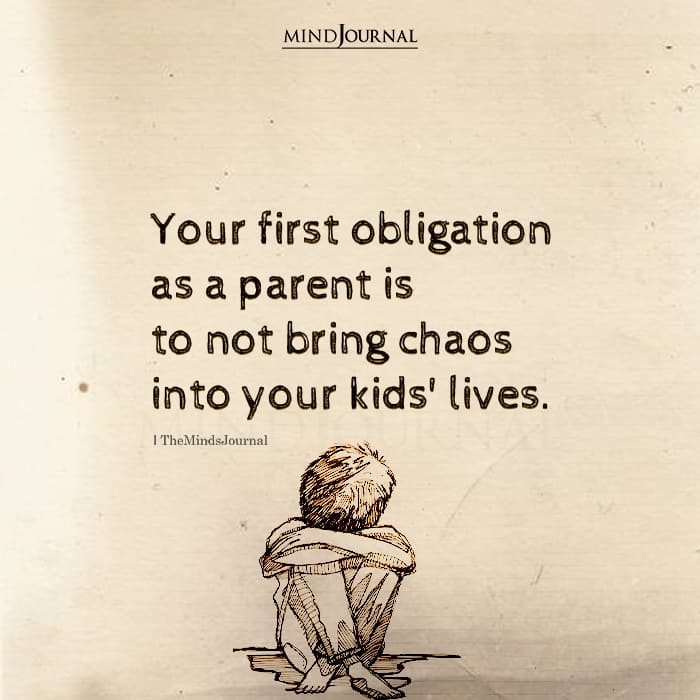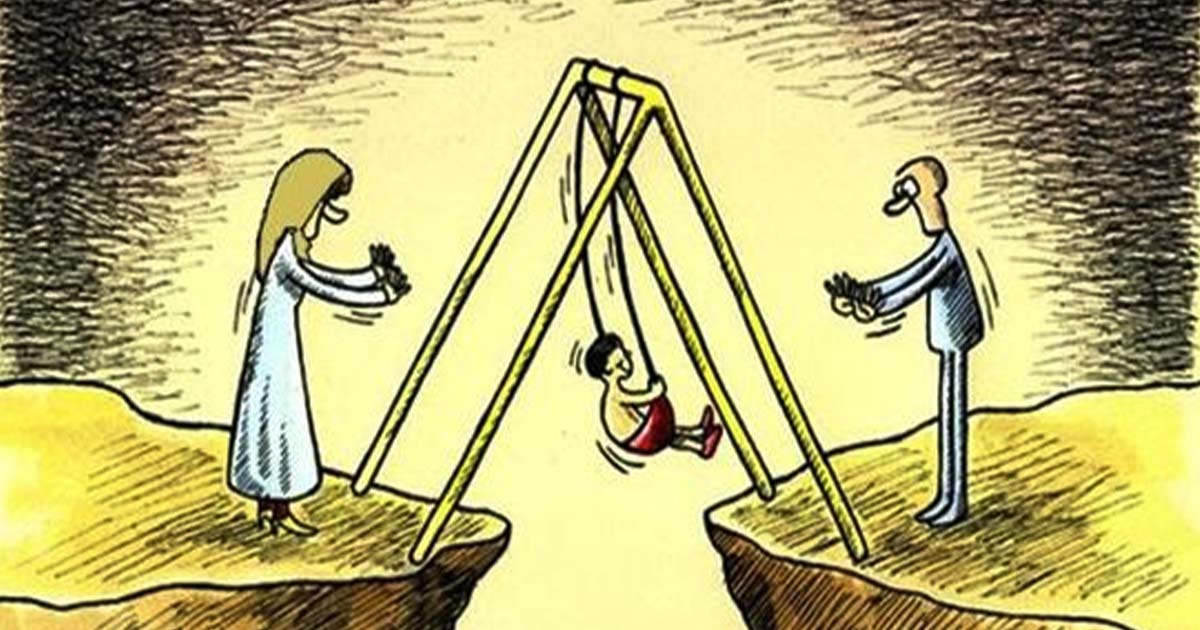Divorce is an emotionally challenging experience, particularly for your little ones. They are the ones who suffer the most and they are the ones least responsible for it! Some couples manage to keep things friendly for the sake of their child but everyone can’t keep things amicable!
Understanding what is parallel parenting can be an asset to managing parenting after divorce! In parallel parenting, co-parents connect without frequent direct contact, creating a middle ground for focused child care, and minimizing constant interaction stress.
In this article, we’ll explore what is parallel parenting, offering practical tips to make this approach work for you and your child after a divorce. So how to make the journey of parenting post-divorce a bit smoother?
Let’s take a look!
What Is Parallel Parenting?
Parallel parenting offers a method for raising children post-divorce when effective communication between parents is challenging. It’s when both parents are still involved in their kids’ lives, but they don’t tell each other too much of anything.

The point behind parallel parenting is setting up a plan. When they each have the kids for some time, they can make decisions on their own without needing to talk to you. The only things they should be talking about are important topics that relate to the kids.
By doing this, it’ll prevent arguments and make life less stressful for everyone around, especially your kids.
However, it may not work with every family and you must understand what works best for you. All that matters is the children are okay and co-parenting isn’t a nightmare when both parents aren’t on good terms anymore.
If you’re living in such a situation, we recommend that you consider a co-parenting approach instead! However, this raises the question of what is the difference between what is parallel parenting vs co-parenting.
Read More: What Are the Psychological Effects of Divorce on Kids? Grasping the Long-Term Impacts
Parallel Parenting Vs Co-Parenting: What’s The Difference?
When parents separate or divorce, figuring out how to handle the kids is difficult. There are various ways parenting after divorce can be done, and co-parenting and parallel parenting offer two different paths.
Co-parenting is when both parents work together. They talk a lot and try to make each home the same for the kids, and even though they aren’t a couple anymore it’s like they’re on the same sports team.
Features that differentiate between Co-parenting and Parallel parenting are:
- Ongoing communication and collaboration between parents.
- Higher level of cooperation and shared decision-making.
Parallel parenting also tries to do what’s best for the kids but in its way. Instead of being best friends with one another, there’s some space to keep things smooth.
The gap between parallel parenting vs co-parenting mostly depends on how much you want to work with your ex to be with your child. It just depends on what each family needs in their circumstance.
Read More: Understanding What Is Co-Parenting: 10 Game-Changing Tips For Being A Great Co-Parent!
Practical Tips For Parallel Parenting After Divorce
Ever tried navigating the waters of what is parallel parenting? It can be a bit tricky at first.
Let’s hear some advice from people who have done this before – actual tips to make things better for everyone, and most especially the kids.
1. Plan for Smooth Transitions
Parents experienced in parallel parenting recommend having a clear schedule for transitions between houses. This will minimize confusion and stress for the children and allow for an easy switch from mom’s house to dad’s house.
2. Use a Shared Calendar for Coordination
A lot of parents find it useful to have a shared online calendar where they can coordinate schedules and important events. This way, both parents will stay informed about school activities, medical appointments, and extracurricular activities without having to communicate directly.
3. Establish Consistent Rules in Both Homes
No matter what, be consistent. Parents underscore the need to create similar rules and expectations in both households. This helps kids feel safe and understand what their obligations are regardless of where they are spending the night.
4. Create a Communication Plan
Set clear guidelines on how communication should take place. Parents say that it is important to focus on necessary information concerning children and use written forms such as emails or text messages so as not to cause misunderstandings or conflicts.
5. Keep Children Out of Adult Issues
Parents point out that children should not be exposed to any conflicts or issues involving adults. In what is parallel parenting it is important to make sure that there is a positive environment created for the kids while keeping them away from adult disagreements.
6. Respect Each Other’s Space
When each parent has his/her own space, it helps keep them away from one another. Parents advise respecting boundaries established within each other’s homes which results in more positivity amongst all parties involved.
7. Encourage Open Communication with the Kids
Parents suggest creating an environment where children feel safe talking about their feelings toward such arrangements. Therefore, open communication helps in addressing any concerns that the kids may have and contributes to emotional well-being.
8. Celebrate Special Occasions Together
Separated parents often suggest coming together for special occasions or significant milestones in their children’s lives. This shared celebration not only builds positive memories but also showcases the ongoing support and love both parents have for their children.
9. Stay adaptable and flexible.
Parallel parenting requires flexibility. Parents suggest being ready to change the schedule or plan to suit unforeseen events taking place which fosters a cooperative and understanding co-parenting dynamic.
10. Seek Professional Support When Needed
It is crucial to know when to get professional help. Therefore, whether counseling or mediation, parents feel there is a need for third-party involvement can help you understand the concepts of what is parallel parenting and even let you consider other parenting options!
So, try these tips from other mothers and fathers whenever you decide to use parallel parenting. Every family is different; however, talking nicely, being flexible, and keeping the kids first can make this work.
However, following these common guidelines becomes even more important when engaging with someone who has significant narcissism personality disorder during co-parenting. In such situations seeking professional assistance is vital.
Read more here: Why Making Peace With Your Ex Is The Doorway To A Happier Life
Managing Parallel Parenting With A Narcissist: What To Do?
Handling parallel parenting with a narcissistic co-parent can be difficult, as their controlling and manipulative tendencies often get in the way.

Parallel parenting is a method made to minimize direct communication between parents who are constantly arguing.
Try these tips to help with managing a narcissist:
1. Set Clear Expectations & Plans
In your parenting plan, make sure to set clear limitations and expectations. As well as being in writing it should also be filed with legal representation. Give all the details you can about custody.
Dates, times, and locations for transfers are all things you should include. I would even go as far as outlining what happens if the plan isn’t followed like involving law enforcement or canceling visitation rights.
2. Maintain Boundaries
Make sure healthy boundaries are established so that everyone can have a good time. With arguments comes overstepping the agreed-upon barriers, so when you’re talking to the other parent remember to respect them.
3. Keep Communication to a Minimum
To alleviate conflict with your narcissistic partner try not to talk too much with them. Only focus on important matters and stick solely to facts, not emotions. The best time for communication would be when the child is in your care.
4. Detach From the Narcissist
Protect yourself from possible harm by disengaging from the other parent whenever it’s possible. Any unnecessary contact will cause manipulation or damage your reputation so try not to talk until it’s needed for your child.
5. Document, Document, Document
Whether big or small incidents should always be documented! You want everything written down with detailed logs of communication and interactions including time stamps just in case something happens in the future that needs proof.
Always remember that consistency and adherence to your technique are necessary to understand what is parallel parenting and implement it effectively.
Read More: 6 Signs of Narcissistic Parenting and How It Shapes A Child’s Future!
A Word From Mind Family
Parallel parenting is a way parents can take care of their kids without having to talk too much to each other. It’s like finding a middle ground so both parents can focus on the kids without arguing all the time.
This may not work for all families, but it can make things easier when you’re trying to get along but it’s just too hard. The only thing that matters is that you make things as easy as possible for your kids.
We asked some other moms and dads who’ve been through this for some tips on what is parallel parenting and here’s what they said: plan things, use a shared calendar, have similar rules in both homes, and talk nicely to them about the changes.
Every family is different but by being nice, flexible, and putting the kids first you can make it work!
Frequently Asked Questions (FAQs)
1. What Is Parallel Parenting?
Parallel parenting post-divorce lets parents share the kids with minimal contact. This allows each to make independent choices during their time, with neither having to worry about the other’s input. The goal is less stress and fighting over co-parenting.
2. What is the difference between parallel parenting vs co-parenting?
Co-parenting and parallel parenting are two ways divorced parents can continue to raise their kids. The first option requires a tighter bond due to how much time both parents will be spending with the child. The second option is more independence, which could be necessary if a relationship between the two parents isn’t possible.
3. What are some practical tips for parallel parenting after divorce?
Make sure the kids feel supported and safe. Don’t make them choose sides, not even during arguments. If there’s a schedule, stick to it. You want to build some stability for your children. Keep in mind that you two are still parents, so make an effort to celebrate things like birthdays together. And when you’re dealing with adult stuff, just remember to give each other space and keep the kids out of it.
4. How to manage parallel parenting with a narcissist?
To manage parallel parenting with a narcissist, keep these things in mind: set clear expectations and plans, maintain healthy boundaries, minimize communication, detach from the narcissist, prioritize detailed documentation, and seek professional support if needed. Focus on consistency, adherence to the plan, and the child’s well-being.











